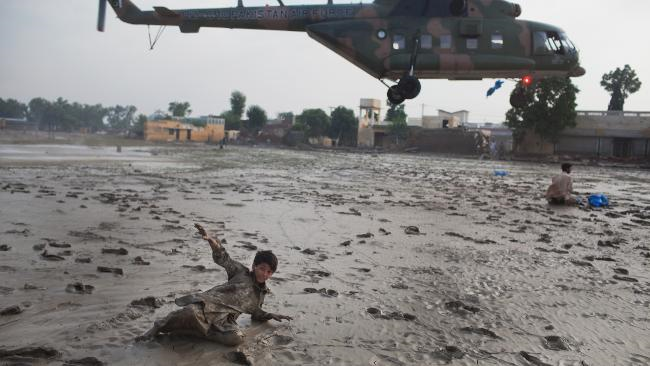Officials point to Russia drought and Asia deluge as consistent with climate change
By Jeremy Hance, www.mongabay.com
August 08, 2010 Government officials are pointing to the drought and wildfires in Russia, and the floods across Central and East Asia as consistent with climate change predictions. While climatologists say that a single weather event cannot be linked directly to a warming planet, patterns of worsening storms, severer droughts, and disasters brought on by extreme weather are expected as the planet warms. In Russia, likely thousands of people have died from heat-related illnesses and 20 percent of the nation’s grain harvest has been lost due to a prolonged drought, record-breaking high temperatures, and hundreds of peatland and forest fires, which have blanketed Moscow in a toxic fog. This summer Moscow has broken 100 degrees Fahrenheit a number of times, while the previous record was 99 degrees Fahrenheit. Russian Prime Minister Vladimir Putin has put a ban on grain exports from Russian in order to keep prices low domestically until 2011. Putin’s announcement aggravated fears of a global food crisis as wheat prices have almost doubled since June. On Thursday, Russian President Dmitry Medvedev told a Russian Security Council meeting, “Everyone is talking about climate change now. Unfortunately, what is happening now in our central regions is evidence of this global climate change, because we have never in our history faced such weather conditions in the past. This means that we need to change the way we work, change the methods that we used in the past.” On Friday Medvedev continued his sudden frankness on climate change, warning that climate change could impact the Winter Olympics. “Frankly, what is going on with the world’s climate at the moment should incite us all (I mean world leaders and heads of public organizations) to make a more strenuous effort to fight global climate change,” he said. Russia is one of the world’s largest greenhouse gas emitters: when emissions due to deforestation are not included, Russia is listed as among the top 4, after China and the US, and nearly equal to India. … At the same time as central Russia is experiencing record heat and debilitating fires, a number of Asian nations have been hit with catastrophic flooding and mud slides. Flashfloods in India have left 132 people dead and some 500 missing, while mudslides in China due to flooding has taken the lives of 127 people. Nearly 50,000 people have been evacuated in China. But to date no nation appears worst hit than Pakistan, where flooding has killed 1,600 people and affected 14 million. Landslides have followed the flooding killing dozens more. Rice crops have also been impacted, furthering concerns of an impending global food crisis. Currently it is estimated that 4 million Pakistani flood victims are in need of food. The floods are being considered the worse in 80 years. Pakistani glaciologist, Prof M. Iqbal Khan, told the Associated Press of Pakistan that the flooding was linked to melting glaciers in upper Pakistan. “I have warned everyone about the floods in Peshawar, Charsadda and Nowshera due to the global warming in my previous interviews but nobody took notice and the result is before us,” he said, adding that “it is the glaciers which are adding fuel to the fire and due to the melting of glaciers the flood situation is aggravated.” …
Officials point to Russian drought and Asian deluge as consistent with climate change
